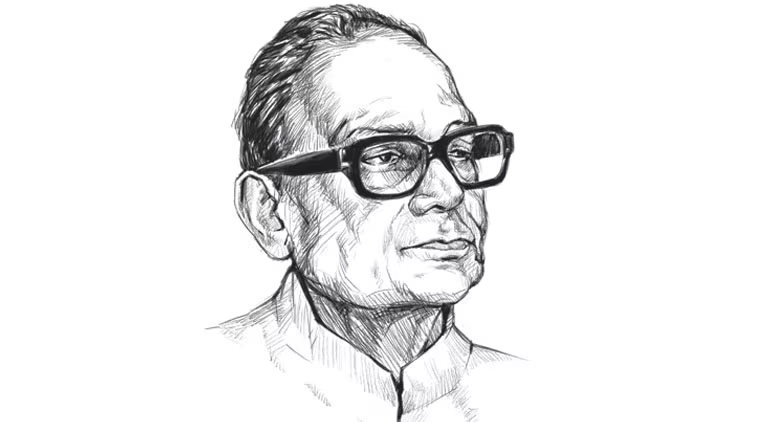Jayaprakash Narayan, often referred to as JP or Lok Nayak (People’s Leader), was one of India’s most influential political leaders and social reformers. His life story is a testament to resilience, dedication, and an unwavering commitment to justice and democracy. From his humble beginnings to becoming a key figure in India’s independence movement and post-independence politics, JP’s journey is nothing short of inspirational. This article delves into the life of Jayaprakash Narayan, exploring his childhood, education, political career, and legacy, while also providing an SEO-optimized narrative for readers seeking comprehensive insights.
Early Life and Childhood The Foundation of a Revolutionary

Birth and Family Background
Jayaprakash Narayan was born on October 11, 1902, in the village of Sitabdiara in the Saran district of Bihar, India. His father, Harsu Dayal Srivastava, was a junior official in the canal department of the British government, and his mother, Phul Rani Devi, was a devout and compassionate woman. JP grew up in a middle-class family that valued education and ethics, which laid the foundation for his future endeavors.
Early Education
JP’s early education began in his village, where he displayed an exceptional aptitude for learning. He later moved to Patna for higher studies and enrolled in the Collegiate School. His academic brilliance earned him a scholarship to study in the United States, a turning point in his life.
Education in the USA Shaping a Visionary
Journey to the United States
In 1922, Jayaprakash Narayan traveled to the United States to pursue higher education. He enrolled at the University of California, Berkeley, and later attended the University of Wisconsin and Ohio State University. During his time in the U.S., he was exposed to the works of Karl Marx, Lenin, and other socialist thinkers, which deeply influenced his political ideology.
Exposure to Socialism and Activism
JP’s time in the U.S. was transformative. He worked various odd jobs to support himself, including as a fruit picker and a mechanic, which gave him firsthand experience of the struggles of the working class. This period solidified his belief in socialism and his commitment to fighting for the rights of the oppressed.
Return to India The Freedom Struggle
Joining the Indian National Congress
Jayaprakash Narayan returned to India in 1929, brimming with revolutionary ideas. He joined the Indian National Congress and became an active participant in the freedom struggle. His leadership skills and organizational abilities quickly earned him recognition.
Role in the Quit India Movement
JP played a pivotal role in the Quit India Movement of 1942, which aimed to end British colonial rule in India. He was instrumental in organizing underground activities and mobilizing the masses. His arrest and subsequent escape from prison became legendary, showcasing his determination and courage.
Post-Independence A Shift in Focus
Disillusionment with Party Politics
After India gained independence in 1947, JP grew disillusioned with the direction of the Congress Party. He believed that the party had strayed from its socialist ideals and was becoming increasingly authoritarian. This led him to distance himself from mainstream politics and focus on social reform.
Founding the Socialist Party
In 1948, Jayaprakash Narayan, along with other like-minded leaders, founded the Socialist Party of India. The party aimed to promote democratic socialism and address the socio-economic inequalities in the country. JP’s vision was to create a society based on equality, justice, and freedom.
The Total Revolution JP’s Defining Movement
Call for Total Revolution
In the 1970s, India was grappling with widespread corruption, unemployment, and political instability. JP emerged as the leader of the Total Revolution movement, which called for a complete overhaul of the political, economic, and social systems. His slogan, “Sampoorna Kranti” (Total Revolution), resonated with millions of Indians.
Opposition to Emergency
JP’s most significant contribution came during the Emergency declared by Prime Minister Indira Gandhi in 1975. He became the face of the opposition, leading mass protests and advocating for the restoration of democracy. His efforts culminated in the formation of the Janata Party, which defeated the Congress in the 1977 elections.
Personal Life and Values
Marriage and Family
Jayaprakash Narayan married Prabhavati Devi in 1920. Prabhavati was a strong-willed woman who shared JP’s commitment to social reform. Despite their differences, the couple supported each other throughout their lives.
Simplicity and Integrity
JP was known for his simplicity and integrity. He lived a frugal life, often donating his earnings to charitable causes. His humility and dedication to public service earned him the respect and admiration of people from all walks of life.
Legacy and Impact
Contributions to Indian Democracy
Jayaprakash Narayan’s contributions to Indian democracy are unparalleled. He championed the cause of the marginalized and fought tirelessly for social justice. His emphasis on grassroots democracy and decentralization continues to inspire political movements in India.
Awards and Recognition
JP received numerous awards and honors, including the Bharat Ratna, India’s highest civilian award, in 1999 (posthumously). His legacy is celebrated through institutions, roads, and awards named in his honor.
Death and Remembrance
Final Years
In his later years, JP’s health deteriorated due to diabetes and heart disease. Despite his failing health, he remained active in public life until his last breath.
Passing Away
Jayaprakash Narayan passed away on October 8, 1979, in Patna, Bihar. His death marked the end of an era, but his ideals and vision continue to guide generations.
Why Jayaprakash Narayan’s Story Matters
Why This Story Resonates
Jayaprakash Narayan’s life is a source of inspiration for anyone striving for social justice and democracy. His story is particularly relevant in today’s world, where issues like corruption, inequality, and authoritarianism remain pressing concerns.
Lessons from JP’s Life
- Resilience: JP’s ability to overcome challenges and remain steadfast in his beliefs is a lesson in resilience.
- Integrity: His commitment to ethical leadership serves as a model for modern-day politicians.
- Grassroots Empowerment: JP’s emphasis on decentralization and community participation offers valuable insights for sustainable development.
Jayaprakash Narayan’s life is a remarkable journey of courage, conviction, and compassion. From his humble beginnings in Bihar to becoming a national icon, JP’s story is a testament to the power of perseverance and the impact of visionary leadership. His legacy continues to inspire millions, reminding us that true success lies in serving humanity and upholding the values of justice and equality.
By understanding and sharing the story of Jayaprakash Narayan, we not only honor his contributions but also draw inspiration to create a better, more equitable world. His life is a beacon of hope and a reminder that one individual’s dedication can indeed transform society.

